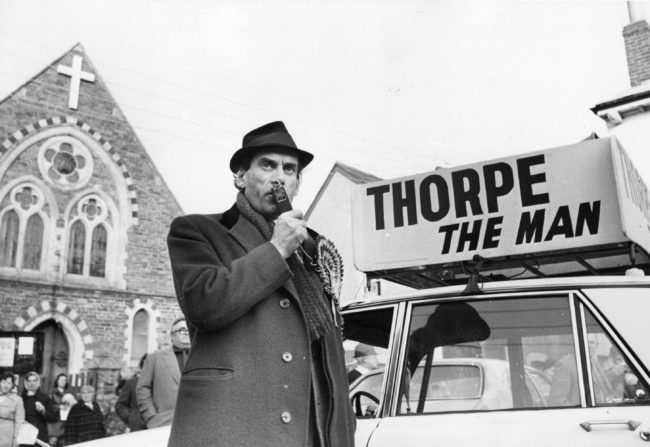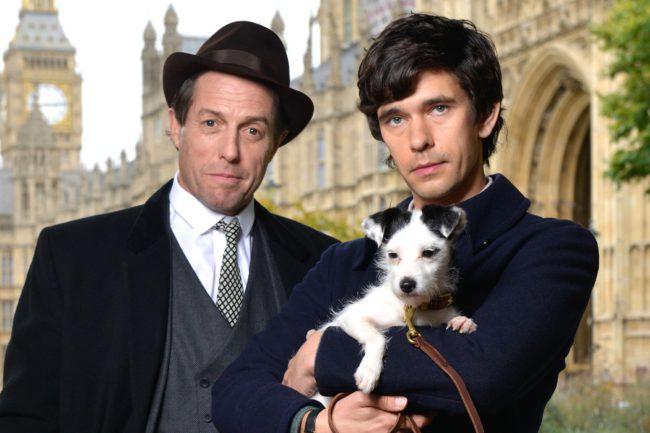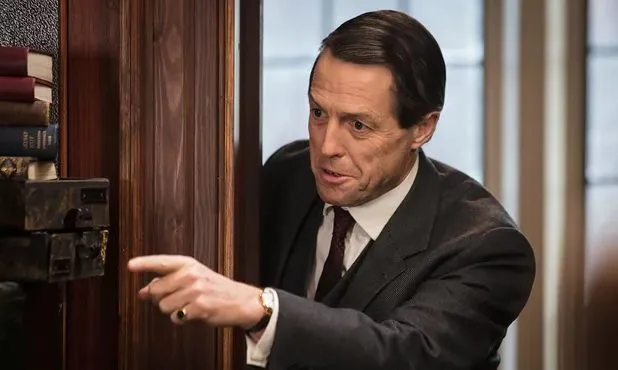Who was Jeremy Thorpe, Hugh Grant’s character in A Very English Scandal?

A Very English Scandal, a BBC miniseries starring Ben Whishaw and Hugh Grant, aired its first episode on Sunday.
4.6 million viewers tuned in to the first episode and many took to social media to praise Grant’s “superb” depiction of bisexual politician Jeremy Thorpe.
Before the three-part drama continues next week, allow us to dive deep into the real story behind Scandal and who Thorpe was.
This article may contain spoilers for A Very English Scandal.
Who was Jeremy Thorpe?
John Jeremy Thorpe was born in South Kensington, London, on April 29, 1929, to John Henry Thorpe, a lawyer and politician, and Ursula Thorpe, the daughter of Conservative Sir John Norton-Griffiths.

Jeremy Thorpe, the Liberal Party leader, during an election campaign in Devon in 1974 (Tony Freeman/Keystone/Getty)
He attended Eton and went on to study law at Trinity College in Oxford but, arguably influenced by his family’s history in that field, he later pursued a career in government.
He rejected Conservative leanings and instead joined the Liberal Party, his favourite slogan being: “A vote for the Liberals is a vote for freedom.”
He served as a Member of Parliament for North Devon from 1959 to 1979. He also acted as leader of the Liberal Party between 1967 and 1976.
Fairly early on in his career, rumours began circulating that Thorpe was actually a homosexual. Said rumours threatened to jeopardise his position as an MP and led to his friend and colleague Peter Bessell (played by Alex Jennings in the show) becoming his self-appointed protector.
In early 1961, Thorpe met stablehand Norman Josiffe, also known as Norman Scott (played by Whishaw). Just a few months later, it is believed that the pair embarked on a love affair which spanned several years. (It’s worth noting though that Thorpe denied any sexual liaisons occurred between them).

Hugh Grant as Jeremy Thorpe and Ben Whishaw as Norman Scott (Kieron McCarron)
During their reported relationship, Thorpe arranged accommodation for Josiffe in London and Barnstaple, North Devon, paid for advertisements in magazines in an attempt to get him work and eventually led Josiffe to discover his passion for dressage. It has been stated that he also helped him secure a groom’s post job in Switzerland.
Thorpe was married twice throughout his life, once to Caroline Allpass from 1968 to 1970 and again to Marion Stein, Countess of Harewood, from 1973 until his death in 2014.
He passed away at the age of 85 in 2014 after a lengthy battle with Parkinson’s Disease.
So, what was the scandal?
While news of the affair between Thorpe and Josiffe was considered controversial back in the 1960s and ’70s, the scandal mentioned in the BBC miniseries doesn’t necessarily mean their relationship itself but the bizarre nature of the rumours and speculation as a whole.
It has been documented that Thorpe’s domineering treatment of Josiffe caused the latter to feel insignificant and out of control of his own life.
In December 1962, it was even reported that he confided to a friend that he was thinking about shooting Thorpe and committing suicide. Said friend allegedly told the police this and a report was added to Thorpe’s MI5 file, but with insufficient proof that Thorpe and Josiffe were in a sexual relationship, they couldn’t take further action.
In the years that followed, Thorpe’s politics profile rose while Josiffe’s marriage disintegrated. He blamed Thorpe, regularly penning letters to him, Bessell and Thorpe’s mother, threatening to go public with their relationship. In retaliation, Thorpe accused Josiffe of blackmailing him.

Thorpe denied having a sexual relationship with Norman Josiffe and insisted that he was attempting to blackmail him (BBC One)
In 1967, Josiffe asked Bessell for assistance in changing his name and moving to America to start a new life but that plan was short-lived. He later returned to England claiming he had crippling medical debts and other bills to pay, which he couldn’t deal with due to his lack of appropriate documentation and insurance card from the time that he was in Thorpe’s ‘care’.
Bessell arranged a retainer of £5,000 to £10,000 to be paid to Josiffe-now-Scott on a weekly basis to keep him from exposing Thorpe.
In October 1975, Scott met a man named Newton, who claimed he had been hired to protect Scott from a Canadian hit man. However, he later shot Scott’s dog and attempted to shoot him, too, but the pistol failed to fire and he ran off.
Four years later, Thorpe was tried in association with the crime on conspiracy and incitement to murder. Thorpe was acquitted of all charges but the case, and the drama surrounding it, ultimately cost him his political career.
A Very English Scandal continues on BBC One on Sunday at 9pm

